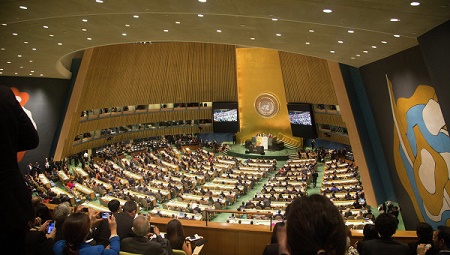UN Declaration on Peasants Rights

On 17 December 2018, the 73rd session of the UN General Assembly adopted the United Nations Declaration on the Rights of Peasants and Other People Working in Rural Areas (UNDROP), [AR] after having passed in the UN Human Rights Council on 19 September 2018. This adoption marked the culmination of seventeen years of lobbying by civil society organizations, including La Via Campesina, FIAN and CETIM, based on inputs from peasants around the world.
UNDROP addresses the rights and needs of peasants, small-scale producers, fishers, pastoralists, nomads, indigenous peoples and others working in rural areas. It aims to improve living conditions, ensure food security and food sovereignty, protect the environment, combat climate change and preserve biodiversity. The Declaration explicitly recognizes the “special relationship and interaction between [these communities] and the land, water and nature to which they are attached.” It also cites violations and adversities that peasants and rural workers undergo, including increased forced evictions and displacement; lack of access to legal institutions that protect against violence; lack of incentives and drudgery, which exacerbates urbanization; high incidences of suicide; challenges in accessing land, water, seeds, and other natural resources; and environmental degradation.
Three quarters of the Assembly voted in favour of the Declaration, including a large majority of Middle Eastern, Asian, African, and Latin American states. Disappointingly, United States, Canada, Australia, and the European states (with the exceptions of Portugal, Switzerland and Ukraine), did not support its adoption. Several states argued that collective rights are not recognized by international law, nor by any of the existing core human rights treaties.
While the Declaration, as such, is non-binding, nonetheless, it will serve as a useful advocacy tool recognized in international law for the advancement of peasants and rural communities and, over time, it is hoped to set new norms and standards in international law and the behavior of states.
Among others, UNDROP affirms these peasants’ and rural workers’ rights to:
Sustainable access to and use of the natural resources present in their communities [and] the right to participate in the management of these resources (Article 5, para 1);
Adequate food, including the right to produce food (Article 15, para 1);
Determine their own food and agriculture systems, including the right to participate in decision-making processes on food and agriculture policy and the right to healthy and adequate food produced through ecologically sound and sustainable methods that respect their cultures (Article 15, para 4);
Land tenure, individually and/or collectively… including the right to have access to, sustainably use and manage land and the water bodies, coastal seas, fisheries, pastures and forests therein (Article 17, para 1);
protection against arbitrary and unlawful displacement from their land or place of habitual residence, or from other natural resources used in their activities and necessary for the enjoyment of adequate living conditions (Article 17, para 4);
Return to their land of which they were arbitrarily or unlawfully deprived, including in cases of natural disasters and/or armed conflict, and to have restored their access to the natural resources used in their activities (Article 17, para 5);
Seeds, including the right to maintain, control, protect and develop their own seeds and traditional knowledge (Article 19, para 1);
Water for personal and domestic use, farming, fishing and livestock keeping and for securing other water-related livelihoods, ensuring the conservation, restoration and sustainable use of water [and] the right to equitable access to water and water management systems, and to be free from arbitrary disconnections or the contamination of water supplies (Article 21, para 2);
Protection against forced eviction from their home, harassment and other threats (Article 24, para 2).
|